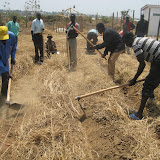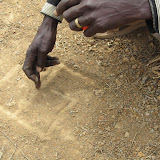Hankins Leave Sudan
There were tears, prayers, singing and heartfelt thanks as Boo and Phyllis Hankins met one last time with the United Methodist pastors in Sudan District. After two years of mission service in Sudan Boo and Phyllis Hankins are leaving Sudan, to return to serve churches in Tennessee at the request of Bishop Swanson of Holston Conference. In fact, they left 3 days ago after preparing Diantha and I to respond to interim tasks such as unexpected medical needs of pastors and the ongoing support of several orphans and sponsored students. The Sudanese pastors thanked them for strengthening the churches and teaching them English and more. Their fellow missionaries thanked them for their example of teamwork and endurance as they persevered resolving crises in church and school. Diantha and I are grateful that God used them to do the difficult pioneering work in the development of the church here, work that not many others we know would be able or willing to do. Twenty-two years of the traumas of war and refugee camps leave deep wounds in peoples' hearts; in the case of the Sudanese United Methodists, these wounds have been exacerbated by the corrupt behavior of several former local church leaders which has deepened a prevailing sense of mistrust. The Hankins have worked step by step with these church members to build stability, continuity, and a sense of being part of a much large connection that will not let them be the victims of the whims of individuals any more.
Women's Division Team Visits Sudan
Two staff (Marva Usher-Kerr, Carol Van Gorp) and a Board member (Ollie Pleggenkuhle) of the Women's Division of the General Board visited South Sudan in April. They held a workshop for the United Methodist Women leaders to help them develop come together as a district, and develop some goals. In preparation for their visit, Diantha researched the existing programs for women's literacy in South Sudan, and the effectiveness of different approaches. We are hoping for their continued support of agricultural training for women, and continue to explore with them a possible approach to increasing the literacy of women, and of beginning village micro-finance programs that would put management of credit in the hands of trained village committees controlled by women.
Reducing Poverty: Our thinking advances...
For 9 months we have been thinking day and night about the issues of poverty we see daily: hunger, lack of money to pay for school fees or medicines. We can see now how the pieces might fit together to allow people to improve their life situations: now they have little income, so there are always more demands and urgent needs and their culture encourages them to help others rather than saving. If we could help them start micro-finance programs, in the future it would allow people to add up small savings in a village "bank" that they manage collectively, and learn to manage their money, which could be used to start income-generating activities or to pay for household needs such as school fees and medicines. There's another key piece of the puzzle: they need to improve their income, which in rural South Sudan mainly means improving agricultural yields and income so they can grow enough for their families, and have some left over to sell. Yet another piece: health is important. If they learn to improve their health and even to grow some of the medicinal plants they need, they are strong enough to contribute to the family income; but if they are sick, they deplete the family income.
Collaboration Blossoms
"How very good and pleasant it is when kindred live together in unity!" (Ps. 133:1) From the time we got here, we've tried to get to know the other groups and people at work in South Sudan, especially in health, agriculture, education and micro-finance. The result last fall was that Diantha was invited by an NGO to help create a manual for training community health workers, and I was asked to be part of interdenominational trainings for pastors youth. At our request, another mission group provided our UM nursery schools with digital players with a variety of teacher training lessons on them. In March we contracted with a Christian Reformed group to provide training for 31 farmers from United Methodist churches. We were concerned that there was no regular gatherings of people doing similar work, to share progress and consider working together; so Diantha and I played a key role in starting monthly informal "teas" around agriculture and another around health. Since then the cooperative work has exploded: the same Christian Reformed group has offered to train for free, two groups of 50 farmers on improved cassava and sweet potatoes from two different villages where there are UM churches; UMCOR is working with us to select one of our remote UM churches for a fish-farming project and is trying to set up a health project so that it benefits another of more remote villages where there is a UM church. While our budget is tiny compared to the other mission and NGO groups here, or perhaps partly because of it, a lot is happening to help the villages we focus on, because of the growing willingness to collaborate.
Wednesday, May 11, 2011
Subscribe to:
Comments (Atom)















